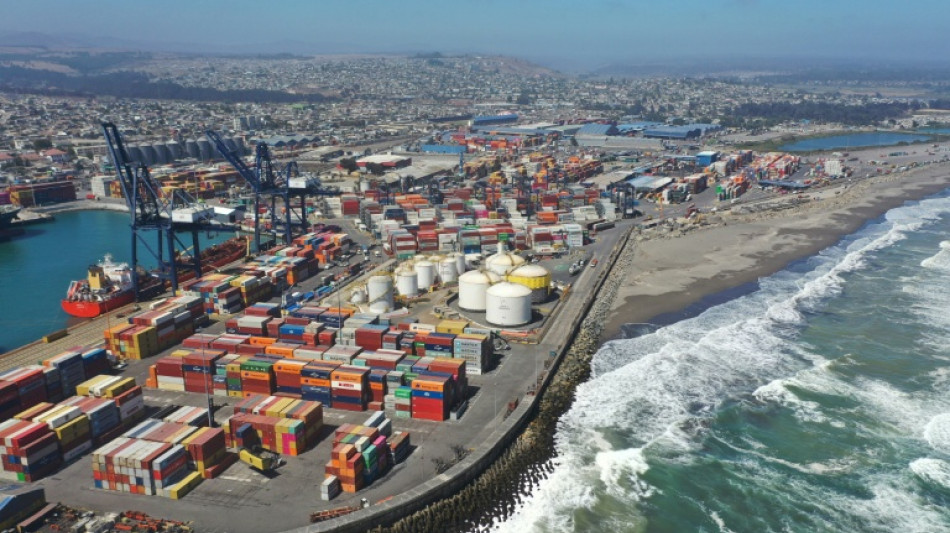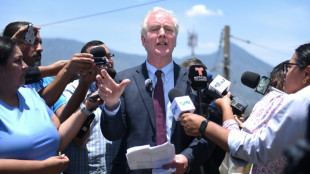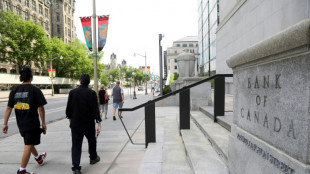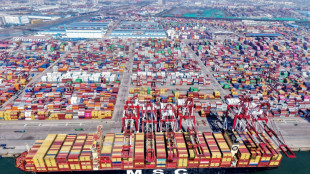
-
 Arsenal oust holders Real Madrid to reach Champions League semis
Arsenal oust holders Real Madrid to reach Champions League semis
-
Arsenal defeat Real Madrid to reach Champions League semis

-
 AMD says US rule on chips to China could cost it $800 mn
AMD says US rule on chips to China could cost it $800 mn
-
Inter hold off Bayern to reach Champions League last four

-
 El Salvador rejects US senator's plea to free wrongly deported migrant
El Salvador rejects US senator's plea to free wrongly deported migrant
-
Newcastle thrash Crystal Palace to go third in Premier League

-
 Zuckerberg denies Meta bought rivals to conquer them
Zuckerberg denies Meta bought rivals to conquer them
-
Starc stars as Delhi beat Rajasthan in Super Over

-
 Weinstein asks to sleep in hospital, citing prison 'mistreatment'
Weinstein asks to sleep in hospital, citing prison 'mistreatment'
-
Amorim asks McIlroy to bring Masters magic to Man Utd

-
 Ruud keeps Barcelona Open defence on course
Ruud keeps Barcelona Open defence on course
-
Trump tariffs could put US Fed in a bind, Powell warns

-
 CONCACAF chief rejects 64-team World Cup plan for 2030
CONCACAF chief rejects 64-team World Cup plan for 2030
-
Putin praises Musk, compares him to Soviet space hero

-
 Son to miss Spurs' Europa League trip to Frankfurt
Son to miss Spurs' Europa League trip to Frankfurt
-
US senator in El Salvador seeking release of wrongly deported migrant

-
 Trump tariffs could put the US Fed in a bind, Powell warns
Trump tariffs could put the US Fed in a bind, Powell warns
-
US judge says 'probable cause' to hold Trump admin in contempt

-
 India opposition slams graft charges against Gandhis
India opposition slams graft charges against Gandhis
-
Nate Bargatze to host Emmys: organizers

-
 US Fed Chair warns of 'tension' between employment, inflation goals
US Fed Chair warns of 'tension' between employment, inflation goals
-
Trump touts trade talks, China calls out tariff 'blackmail'

-
 US judge says 'probable cause' to hold govt in contempt over deportations
US judge says 'probable cause' to hold govt in contempt over deportations
-
US eliminates unit countering foreign disinformation

-
 Germany sees 'worrying' record dry spell in early 2025
Germany sees 'worrying' record dry spell in early 2025
-
Israel says 30 percent of Gaza turned into buffer zone

-
 TikTok tests letting users add informative 'Footnotes'
TikTok tests letting users add informative 'Footnotes'
-
Global uncertainty will 'certainly' hit growth: World Bank president

-
 EU lists seven 'safe' countries of origin, tightening asylum rules
EU lists seven 'safe' countries of origin, tightening asylum rules
-
Chelsea fans must 'trust' the process despite blip, says Maresca

-
 Rebel rival government in Sudan 'not the answer': UK
Rebel rival government in Sudan 'not the answer': UK
-
Prague zoo breeds near-extinct Brazilian mergansers

-
 Macron to meet Rubio, Witkoff amid transatlantic tensions
Macron to meet Rubio, Witkoff amid transatlantic tensions
-
WTO chief says 'very concerned' as tariffs cut into global trade

-
 Sports bodies have 'no excuses' on trans rules after court ruling: campaigners
Sports bodies have 'no excuses' on trans rules after court ruling: campaigners
-
Zverev joins Shelton in Munich ATP quarters

-
 The Trump adviser who wants to rewrite the global financial system
The Trump adviser who wants to rewrite the global financial system
-
US senator travels to El Salvador over wrongly deported migrant

-
 UN watchdog chief says Iran 'not far' from nuclear bomb
UN watchdog chief says Iran 'not far' from nuclear bomb
-
Trump says 'joke' Harvard should be stripped of funds

-
 Macron vows punishment for French prison attackers
Macron vows punishment for French prison attackers
-
Canada central bank holds interest rate steady amid tariffs chaos

-
 Rubio headed to Paris for Ukraine war talks
Rubio headed to Paris for Ukraine war talks
-
Australian PM vows not to bow to Trump on national interest

-
 New attacks target France prison guard cars, home
New attacks target France prison guard cars, home
-
Global trade uncertainty could have 'severe negative consequences': WTO chief

-
 Google facing £5 bn UK lawsuit over ad searches: firms
Google facing £5 bn UK lawsuit over ad searches: firms
-
Onana to return in goal for Man Utd against Lyon: Amorim

-
 Tiktok bans user behind Gisele Pelicot 'starter kit' meme
Tiktok bans user behind Gisele Pelicot 'starter kit' meme
-
'Put it on': Dutch drive for bike helmets


Rising seas test defenses of South American ports
When waves come crashing over the sea wall in Chile's biggest port of San Antonio, dockers run for cover.
The state-run port, which handles 1.7 million containers annually, is frequently lashed by swells several meters high as rising ocean levels linked to climate change cause more frequent storm surges.
Some of the waves dwarf the wall that protects the port from where Chile ships wine and fruit to the world, ripping away 20-ton blocks of concrete defenses.
Since 2020, approximately 270 vessels each year have been either unable to dock at the port or set sail from San Antonio because of the raging seas.
San Antonio's location, in a wide bay with no natural defenses, leaves it particularly vulnerable to storm surges, said Andres Orrego, director of Chile's Portal Portuario shipping news site.
But all along South America's Pacific coast, shipping is being buffeted by rising sea levels.
With the southern hemisphere's approaching winter, when the biggest swells occur, the race is on to keep the tide at bay.
The new Chinese-built megaport at Chancay in Peru, which was inaugurated by President Xi Jinping in November, comes with a massive breakwater almost three kilometers (two miles) long.
On a recent day of calm seas at San Antonio, cranes were busy moving blocks to reinforce the sea wall and top it with curved concave blocks that break the waves' momentum as part of an $11-million climate mitigation upgrade.
Half of the wall has already been reinforced, helping reduce the number of days the port is out of action, from 47 in 2023 to 30 last year.
Over 1,300 kilometers to the north, the port of Antofagasta, which handles most of Chile's copper exports -- Chile is the world's biggest producer of the metal -- also plans to boost its storm defenses to reduce downtime.
- Major investment required -
The biggest port in the South Pacific, Callao port in Peru, is protected by a breakwater nearly 13 meters (43 feet) high.
The two nearby islands of San Lorenzo and El Fronton also act as natural coastal barriers.
And yet the port was forced to close for 10 days at the end of 2024, during storms that brought waves of up to four meters and raised concerns for worker safety.
Storm surges have also caused a slowdown in activity at Manta in Ecuador, a major tuna export hub which was forced to close for several days last year, according to the port's management.
The water swept away two barriers installed on stilts, leading the port operator to declare that "coastal protection works... and adaptation strategies... are now required."
Chilean climatologist Raul Cordero blames the "more intense and frequent storm surges" along the Pacific coast on the increase in ocean temperatures and levels.
"A lot of money will have to be invested in protection against (extreme) waves," he warned.
The port operators that spoke to AFP declined to give estimates for the revenue lost to rising seas.
But shipping companies have to pay between $80,000 and $150,000 for each extra day they remain moored in San Antonio, the port's deputy operations manager told AFP.
Jose Aldunate, who is in charge of boosting San Antonio's storm defenses, said he expects the port's new defenses to be breached by some extreme swells.
But he expressed confidence that, once the upgrade is finished in 2026, the flooding would be "within acceptable levels, so that the port can continue operating without problems."
A.Ruegg--VB


